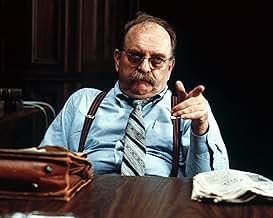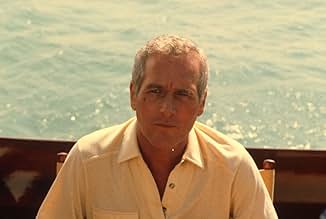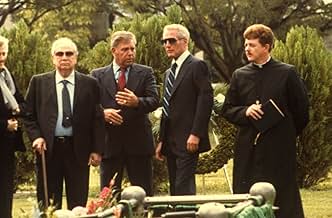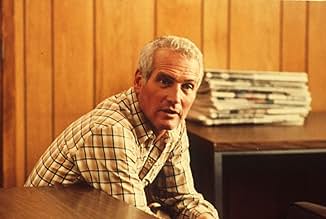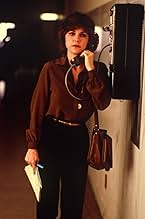CALIFICACIÓN DE IMDb
6.9/10
16 k
TU CALIFICACIÓN
Cuando un fiscal filtra una falsa historia de un dueño de un almacén de licores involucrado en el asesinato de un jefe sindical, su vida comienza a desentrañarse.Cuando un fiscal filtra una falsa historia de un dueño de un almacén de licores involucrado en el asesinato de un jefe sindical, su vida comienza a desentrañarse.Cuando un fiscal filtra una falsa historia de un dueño de un almacén de licores involucrado en el asesinato de un jefe sindical, su vida comienza a desentrañarse.
- Dirección
- Guionista
- Elenco
- Nominado a 3 premios Óscar
- 3 premios ganados y 8 nominaciones en total
Phanie Napoli
- Nickie
- (as Anna Marie Napoles)
William Kerwin
- Walker - Standard's Photographer
- (as Rooney Kerwin)
- Dirección
- Guionista
- Todo el elenco y el equipo
- Producción, taquilla y más en IMDbPro
Opiniones destacadas
Sydney Pollock directed this interesting drama starring Paul Newman as Miami Liquor salesman Mike Gallagher, who is the son of a mobster, though Mike himself is unconnected. When a Union Head is murdered, and mob involvement suspected, an overambitious Federal Attorney(played by Bob Balaban) decides to pressure Mike into helping them(even knowing his innocence) by going to irresponsible reporter Megan Carter(played by Sally Field) to publish the story. Mike has a solid alibi for the murder, but won't reveal it because it would hurt his fragile friend Teresa(played by Melinda Dillon) When the story(and her involvement) is published, it leads to tragic consequences, and Mike decides to teach the reporter and FBI a lesson by beating them at their own game...
Well acted and made drama makes good points about the media and personal responsibility. Almost goes wrong with misguided romance of Mike and Megan, but rights itself with memorable finale, with Wilford Brimley stealing the film in a fantastic supporting performance, laying down the law in amusing yet intelligent fashion.
Well acted and made drama makes good points about the media and personal responsibility. Almost goes wrong with misguided romance of Mike and Megan, but rights itself with memorable finale, with Wilford Brimley stealing the film in a fantastic supporting performance, laying down the law in amusing yet intelligent fashion.
To begin with, I had intended to include this in my tribute to director Pollack in June but somehow couldn’t trace the VHS I had it taped on; in the meantime, I acquired the film on DVD and, watched now as a valediction to recently-deceased star Paul Newman, it easily emerged as the most significant title of the lot. The picture itself had given new impetus to his career – though it would be overshadowed by his next effort, THE VERDICT (1982) – which had dwindled since the block-busting box-office performances of both THE STING (1973) and THE TOWERING INFERNO (1974).
An absorbing and uniformly well-acted blend of newspaper movie, political thriller, character study and romance (with the latter being the least successful i.e. most disposable and unconvincing element), the film deservedly earned Oscar nominations for Newman (his sixth – playing a longshoreman who starts being investigated about the murder of a rival simply because of his parental link to mobsters and the damage it causes to his integrity and daily existence), Melinda Dillon (as a friend of Newman’s who’s brought in to supply an alibi for him but which would expose the guilt in her own personal matters and which lead her to commit suicide!) and Kurt Luedtke’s fine, incisive script. Sally Field isn’t an actress I’m particularly fond of (for the record, I’ve watched neither of her two Oscar-winning performances in NORMA RAE [1979] and PLACES IN THE HEART [1984]: their directors, Martin Ritt and Robert Benton respectively, would coincidentally prove crucial to Newman himself!), though she’s perfectly cast here in a role encompassing resourcefulness, tenacity, awkwardness, tenderness and, finally, humility. She’s the star reporter who initially ‘leaks’ the news of the investigation on Newman thinking it as her duty, but doesn’t stop to ponder the consequences…as a result of which, her relationship with Newman proves a troubled one (in the film’s most intense sequence, he physically assaults her when she turns up before him after Dillon’s death!).
The title is a reference to a legal clause which basically states that newspapers are free to print anything they like, and that the people involved can do nothing against them because their reporting is accurate (even if it may not ultimately prove to be factual). The film’s climax – which plays like a dry-run for THE VERDICT itself and is highlighted by a scene-stealing turn from Wilford Brimley, it’s revealed how Newman has cleverly rebounded the affair on itself (so that it’s the reporters, the investigating committee and the D.A’s office who get their gooses cooked, as it were!). A nice surprise is Luther Adler’s appearance as Newman’s mobster uncle – and also worth mentioning is Dave Grusin’s fine score.
An absorbing and uniformly well-acted blend of newspaper movie, political thriller, character study and romance (with the latter being the least successful i.e. most disposable and unconvincing element), the film deservedly earned Oscar nominations for Newman (his sixth – playing a longshoreman who starts being investigated about the murder of a rival simply because of his parental link to mobsters and the damage it causes to his integrity and daily existence), Melinda Dillon (as a friend of Newman’s who’s brought in to supply an alibi for him but which would expose the guilt in her own personal matters and which lead her to commit suicide!) and Kurt Luedtke’s fine, incisive script. Sally Field isn’t an actress I’m particularly fond of (for the record, I’ve watched neither of her two Oscar-winning performances in NORMA RAE [1979] and PLACES IN THE HEART [1984]: their directors, Martin Ritt and Robert Benton respectively, would coincidentally prove crucial to Newman himself!), though she’s perfectly cast here in a role encompassing resourcefulness, tenacity, awkwardness, tenderness and, finally, humility. She’s the star reporter who initially ‘leaks’ the news of the investigation on Newman thinking it as her duty, but doesn’t stop to ponder the consequences…as a result of which, her relationship with Newman proves a troubled one (in the film’s most intense sequence, he physically assaults her when she turns up before him after Dillon’s death!).
The title is a reference to a legal clause which basically states that newspapers are free to print anything they like, and that the people involved can do nothing against them because their reporting is accurate (even if it may not ultimately prove to be factual). The film’s climax – which plays like a dry-run for THE VERDICT itself and is highlighted by a scene-stealing turn from Wilford Brimley, it’s revealed how Newman has cleverly rebounded the affair on itself (so that it’s the reporters, the investigating committee and the D.A’s office who get their gooses cooked, as it were!). A nice surprise is Luther Adler’s appearance as Newman’s mobster uncle – and also worth mentioning is Dave Grusin’s fine score.
I taped this lauded 80's movie months ago and prompted by the recent death of Paul Newman, finally made time to watch it, only realising as I did so that its director too, Sydney Pollack, has also lately taken his last bow. The film is about the corrupting power of trial by newspaper to damage and sometimes destroy innocent lives and in this particular case of one man's courage and ingenuity in fighting back, even for what seems in the end a Pyrrhic victory against his malefactors. Pollack's favoured ouevre certainly seemed to be contemporary thrillers, often positing a faceless establishment body, personified by dehumanised no-names and their usually destructive oppression of innocent individuals. Although dated by things like contemporary fashions and background music, (no-one surely can defend this era for its style and music!) these films (and there were loads of them in the mid 70's and early 80's - "All the President's Men", "Dog Day Afternoon", "The Verdict", to name but a few, often directed by the two Sydneys, Pollack and Lumet, and peopled by acting heavyweights like Pacino, Redford, Newman, Winger and Fonda) represent a largely neglected sub-genre of quality movie-making rarely seen today. The film at hand here, "Absence of Malice" occasionally lacks narrative drive and suspense but makes up for that with everyday realism, for example drawing in themes on disparate subjects like abortion and trade-union relations. With Pollack's usual high-standard cinematography, particularly his naturally-lit interiors and indeed exteriors, you always feel that this fictional story could actually be happening here and now. It's helped by good dialogue and the skills of the ensemble acting cast. Newman walks away with the acting plaudits, effortlessly drawing the viewer's sympathy and admiration although I was very impressed by Melinda Dillon's underplaying of her part as Newman's "close personal friend", caught in the cross-fire and also Wilford Brimley's cameo as the State Department official who effectively acts as judge and jury at the mini-courtroom climax. Sally Field, who was briefly, at this time, the it-girl for modern-day character parts, lacks some heft alongside the predominantly male cast and at times plays the part more like Jean Arthur than Faye Dunaway. You can also see her acting at key points, particularly in the scene when Newman loses his temper and almost assaults her. Despite a brief (perhaps unnecessary) romantic liaison between the two leads, the film ends satisfyingly with an enigmatic shot of Newman sailing (literally) into the sunset leaving a chastened Field behind. In conclusion then, an intelligent, thought-provoking, well-structured and plotted movie, its main theme still relevant today in tabloid-land.
Paul Newman and Sally Field, though somewhat opposites both in their roles as Michael Colin Gallagher and Megan Carter respectively and in real Hollywood life, mesh and make believable lovers. Megan tells Michael that she is 30 something and doesn't need courting to play in the hay. Michael retorts, "Maybe I do," and drives away. Megan winds up somewhat of a failure both as a newspaper hound and as a liberated female. Then along comes Wilford Brimley in a bit part and runs away with the show. That's saying a lot since the well chosen cast gives it all they've got including ace jobs by Bob Balaban and Melinda Dillon.
The essence of the film is "What is the nature of truth?" What we read in the paper ain't necessarily so. Jibes are poked at bureaucrats too who certainly have problems determining what is truth. As long as the paperwork looks good then so goes the world. With the Horatio Alger success formula still around in the world of big government and big business, empire builders are a dime a dozen. Usually their asses are saved by cover ups and fall guys. In "Absence of Malice" the innocent victim outsmarts the bureaucrats and the Fourth Estate to bring the house of cards down, certainly an anomaly in the 21th century as it was in 1981, maybe even more so.
Admittedly, the film becomes too preachy at times which not only grates on the nerves but also slows the picture down. Yet the well-written script and Sydney Pollack's knowing direction keep it from becoming a total disaster. Not on the level of Pollack's previous "Three Days of the Condor" or his next feature "Tootsie," "Absence of Malice" still packs a wallop.
The essence of the film is "What is the nature of truth?" What we read in the paper ain't necessarily so. Jibes are poked at bureaucrats too who certainly have problems determining what is truth. As long as the paperwork looks good then so goes the world. With the Horatio Alger success formula still around in the world of big government and big business, empire builders are a dime a dozen. Usually their asses are saved by cover ups and fall guys. In "Absence of Malice" the innocent victim outsmarts the bureaucrats and the Fourth Estate to bring the house of cards down, certainly an anomaly in the 21th century as it was in 1981, maybe even more so.
Admittedly, the film becomes too preachy at times which not only grates on the nerves but also slows the picture down. Yet the well-written script and Sydney Pollack's knowing direction keep it from becoming a total disaster. Not on the level of Pollack's previous "Three Days of the Condor" or his next feature "Tootsie," "Absence of Malice" still packs a wallop.
... as audiences would not relate to anything this cynical prior to Watergate. This was made only seven years afterwards.
Sally Field is an ethically-challenged reporter. With the help of an even more unscrupulous federal investigator, played by Bob Balaban, she writes a story that implicates Michael Gallagher (Paul Newman) in the disappearance & presumed murder of a union boss. Gallagher is on the radar because his uncle is a mobster. The film employs a procedural narrative that delivers little dramatic tension. The severest act happens off screen. The characters feel slightly underwritten. The exception is Melinda Dillon's poignant portrayal of Teresa Perrone, Gallagher's best friend, who occupies the moral epicenter.
While everyone else is playing a game of extreme cynicism, not uncommon in journalism and politics, Teresa feels most acutely. I liked the straight-forward approach and lack of style. Of course, director Sydney Pollack was never known as a stylist. I'm not saying this in the pejorative. I enjoy Pollack's work. Wilford Brimley makes a needed, late appearance to munch down on some scenery.
It does have the distinct feel of a film made to make a go for the Oscars, with Paul Newman making repeated failed runs at the Best Actor prize at this point in his career. Still Newman in the lead gave gave a film at that time the same amount of heft that Tom Hanks in the lead gives a film today.
Sally Field is an ethically-challenged reporter. With the help of an even more unscrupulous federal investigator, played by Bob Balaban, she writes a story that implicates Michael Gallagher (Paul Newman) in the disappearance & presumed murder of a union boss. Gallagher is on the radar because his uncle is a mobster. The film employs a procedural narrative that delivers little dramatic tension. The severest act happens off screen. The characters feel slightly underwritten. The exception is Melinda Dillon's poignant portrayal of Teresa Perrone, Gallagher's best friend, who occupies the moral epicenter.
While everyone else is playing a game of extreme cynicism, not uncommon in journalism and politics, Teresa feels most acutely. I liked the straight-forward approach and lack of style. Of course, director Sydney Pollack was never known as a stylist. I'm not saying this in the pejorative. I enjoy Pollack's work. Wilford Brimley makes a needed, late appearance to munch down on some scenery.
It does have the distinct feel of a film made to make a go for the Oscars, with Paul Newman making repeated failed runs at the Best Actor prize at this point in his career. Still Newman in the lead gave gave a film at that time the same amount of heft that Tom Hanks in the lead gives a film today.
¿Sabías que…?
- TriviaPaul Newman once said of this movie while publicizing Será justicia (1982): "I'd rather have the freedom to do the kind of pictures like Será justicia (1982) ... I enjoyed kicking the beejeezus out of the press in Ausencia de malicia (1981)."
- ErroresAfter spending his first night with Megan, Michael tells her as he is leaving that it is 5:30 a.m. It is clearly daylight outside. In Miami in mid-December, it would still be dark outside at that time.
- Citas
James J. Wells: You had a leak? You call what's goin' on around here a leak? Boy, the last time there was a leak like this, Noah built hisself a boat!
- ConexionesEdited into Absence of Satan (1985)
Selecciones populares
Inicia sesión para calificar y agrega a la lista de videos para obtener recomendaciones personalizadas
Detalles
Taquilla
- Presupuesto
- USD 12,000,000 (estimado)
- Total en EE. UU. y Canadá
- USD 40,716,963
- Fin de semana de estreno en EE. UU. y Canadá
- USD 97,667
- 22 nov 1981
- Total a nivel mundial
- USD 40,716,963
Contribuir a esta página
Sugiere una edición o agrega el contenido que falta


